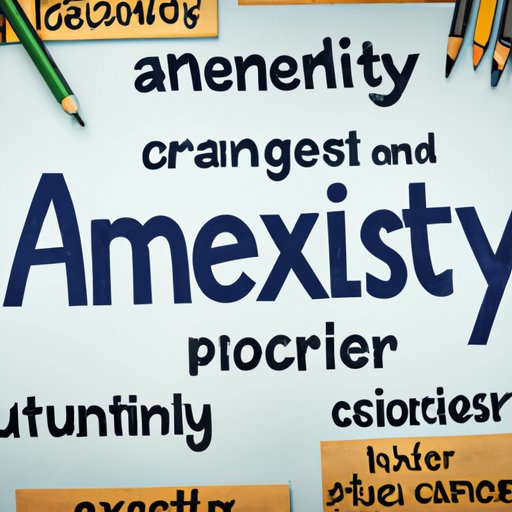
Introduction
Anxiety is a common mental health condition that can impact people’s lives in a variety of ways. It can manifest in physical symptoms, emotional distress, and may interfere with daily life if left untreated. The purpose of this article is to help readers identify if they are experiencing anxiety and to offer a better understanding of what to do about it.
Symptoms to Look Out For
Some of the physical symptoms of anxiety include heart palpitations, sweating, shaking or muscle tension. Emotional symptoms of anxiety include excessive worrying, irritability, feeling on edge, or avoiding certain activities. It’s important to note that everyone experiences anxiety differently, meaning not everyone will have all of these symptoms.
Understanding Different Types of Anxiety
Generalised anxiety disorder, panic disorder, social anxiety disorder, as well as other specific phobias are some of the main types of anxiety disorder. Each type of anxiety has unique symptoms and triggers, but they all include excessive fear or worry. It’s important to seek a correct diagnosis from a mental health professional to access the appropriate treatment plan.
The Role of Stress and Anxiety
While stress can contribute to anxiety, not everyone who is stressed will develop anxiety. It’s crucial to know the difference between a normal amount of anxiety and anxiety that can interfere with your daily life. To manage stress, try practicing mindfulness, seeking support from loved ones and engaging in activities you enjoy. If stress and anxiety are overwhelming, consider reaching out to professional help.
Self-Assessment Tools
Reputable websites such as the National Institute of Mental Health and the Anxiety and Depression Association of America offer free self-assessment quizzes. These screening tools help you understand your symptoms by answering questions about your symptoms and severity. While these tools should not be used as a sole diagnosis, they can point you in the right direction to get help.
Treatment Options
Common treatments for anxiety include therapy and medication. Therapy can help you manage symptoms and teach you coping mechanisms. Cognitive behavioural therapy (CBT) is a type of talk therapy frequently used to treat anxiety. Medications such as serotonin norepinephrine reuptake inhibitors (SNRIs) or selective serotonin reuptake inhibitors (SSRIs) are regularly used to treat anxiety. Remember that treatment for anxiety is tailored to individual people, it’s essential to discuss options with a mental health professional.
Conclusion
Anxiety is a challenging condition to navigate, and it can be hard to recognise when it’s becoming problematic. If you’re experiencing symptoms of anxiety, know that help is available, and there’s no need to suffer. Reach out to a mental health professional to receive a correct diagnosis and an appropriate plan of support. Additionally, try practising relaxation techniques, engage in regular exercise, and seek support from family and friends. Above all, tend to your mental health.




